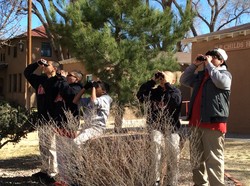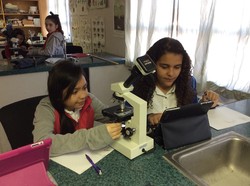Even at the ripe old age of 119, the Menaul School is still on the cutting edge.
The private Presbyterian Church (U.S.A.)-related secondary school in Albuquerque, N.M., founded in 1896 by Presbyterian missionaries, has always been committed to innovation—both in its programming and in upgrading its facility—in order to carry out its visionary work to educate young men and women to become successful leaders in their communities.
Originally established as a boarding school in its present location to serve Spanish-speaking boys from New Mexico, today the co-educational day school for grades 6 through 12 accepts and serves students from all cultural, religious and socio-economic backgrounds. Since its first graduating class in 1906, more than 90 percent of Menaul graduates have gone on to higher education. In more recent years, that number has increased to 98 percent.
Although overseen by an independent and volunteer board of trustees, Menaul’s historic relationship with the Presbyterian Church—including the church’s support of the school through the annual Christmas Joy Offering and other Presbyterian mission funds—continues more than a century later, most recently with a second grant to Menaul from the John C. Martin Teaching of the Bible Award.
The John C. Martin Award, a new grant program created in 2012 by a partnership between the Racial Ethnic & Women’s Ministries ministry area and the office of Financial Aid for Service, supports teaching of the Bible at Presbyterian-related racial ethnic schools and colleges. The purpose of the program is to provide funding for new programs, or new aspects to existing programs, for teaching the Bible.
Menaul used its first award in 2012 to develop curriculum for its upper and middle school science classes to emphasize environmental stewardship, life science and theology. Because the grant covered the expenses of an interdisciplinary staff team who researched and wrote the curriculum, other resources were freed up at Menaul to build a greenhouse that became a laboratory for the students.
On the heels of that success, Menaul turned its attention to developing a holistic, cross-disciplinary approach to teaching that science and faith are not in opposition.

Menaul 6th grade boys on a bird watching expedition on Menaul School campus using binoculars purchased with John C. Martin Award grand funds. —Laurie Gilbert
“Today, too many see [science] and faith in irreconcilable conflict, a view reinforced by many independent schools with historic religious ties,” writes Dianne L. Campbell, Menaul’s director of development, in the school’s 2014 proposal. “However, Presbyterians have always seen science as a sacred gift to be treasured and not feared. We at Menaul School think it is important for our students not simply to discover that science and religion are not in opposition but even more to celebrate how the study of one enriches our understanding of the other.”
As with the 2012 grant, expenses for the 2014 program, entitled “Telescope to Microscope: Exploring Creation through Science,” were primarily in the area of staff time for researching, writing, and implementing the new curriculum as well as relatively modest investments in books, equipment, and supplies. The consumable expenses for future years are modest, and the program—and its impact on students and staff—will be sustainable for many years to come.
“Menaul School has consistently sought to leverage grants from the Teaching of the Bible Grant to redirect resources in a way that complements the program,” says Laura Bryan, associate for Financial Aid for Service for the Presbyterian Mission Agency. “When we help the school pay staff to develop curriculum, the school can take the funding that would have paid staff to add complementary elements to the program design that are not truly in the scope of the Bible grant. The 2012 grant paid staff for curriculum development and the school invested what they saved in staff time in the non-recurring expense of building a greenhouse. The 2014 grant freed resources to purchase microscopes and telescopes.”
In its second century of service, Menaul remains committed to giving its students the skills they need to transform the world.
“New ways of teaching, combined with solid problem-solving skills and adaptability, pave the pathway to success for tomorrow’s leaders,” says Lindsey R. Gilbert, Jr., president and head of the school. “Our program has been improved and students blessed because of this grant.”
The open application period for 2015 begins May 1 and concludes July 1. The application is available here. For more information, contact Laura Bryan by phone at 800-728-7228, ext. 5735, or by email.

